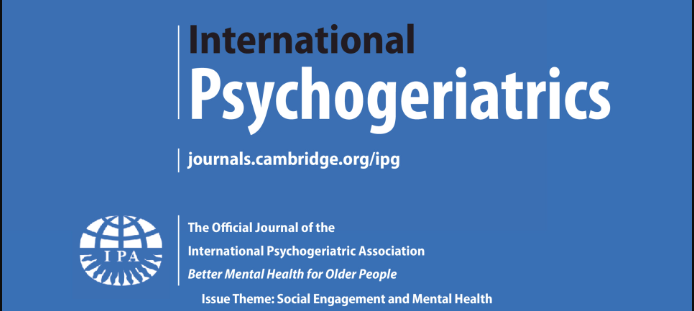Mild Behavioral impairment (MBI) and late-life psychiatric disorders: Differential clinical features and outcomes.
IF 4.6
2区 医学
Q1 GERIATRICS & GERONTOLOGY
引用次数: 0
Abstract
Mild Behavioral Impairment (MBI) refers to a late-onset neurobehavioral syndrome in which neuropsychiatric symptoms (NPS) represent early markers of dementia. Though being a promising diagnostic category for neurobiological research, in daily clinical practice, the boundaries and relationships between MBI and late-life psychiatric disorders are yet to be established. Particularly, no studies have been conducted so far on the prognostic implications of an MBI diagnosis in the psychogeriatric context.For these reasons, since June 2020, we are conducting a prospective longitudinal study on MBI in psychogeriatric patients. On June 2022, 144 elderly patients (≥50 years) referred to the outpatient clinic of the 2nd Psychiatric Unit of the University of Pisa had been recruited. Patients had been diagnosed with a primary psychiatric disorder (N=73, 50.6%), MBI (N=40, 27.8%) or dementia (N=31, 21.5%). Patients with MBI showed a significantly higher age at onset of psychiatric disorders and depressive episodes than patients diagnosed with primary psychiatric disorders. MCI and vascular leukoencephalopathy were also more common in patients with MBI. Moreover, compared to primary psychiatric disorders, MBI was associated with a significantly higher psychopathology severity, especially in the apathy and negative symptoms domain.Preliminary longitudinal analyses were also performed on a subsample of 83 patients followed-up for at least 3 months (on average for one year): at baseline 44 patients had been diagnosed with primary mood disorders including 23 patients in remission and 21 patients with current mood episodes; 22 patients had MBI and 17 were diagnosed with dementia. While at follow-up patients with mood episodes showed a significant decrease in psychopathology severity and increase in global functioning, those with MBI had no significant improvements.In conclusion, MBI is a common condition in psychogeriatric settings and shows distinctive clinical features that may help differential diagnosis. Moreover, the presence of MBI in patients with late-life psychiatric disorders may affect both clinical and functional outcomes. The recognition of patients with MBI symptoms, including apathy, might be useful for the early detection of individuals with poor prognosis.轻度行为障碍(MBI)和晚期精神障碍:不同的临床特征和结果。
轻度行为损伤(MBI)是指一种晚发神经行为综合征,其中神经精神症状(NPS)是痴呆的早期标志。MBI 虽然是神经生物学研究中一个很有前景的诊断类别,但在日常临床实践中,MBI 与晚年精神障碍之间的界限和关系仍有待确定。因此,自 2020 年 6 月起,我们开始对老年精神病患者的 MBI 进行前瞻性纵向研究。2022 年 6 月,我们招募了 144 名老年患者(≥50 岁)到比萨大学第二精神科门诊就诊。患者被诊断出患有原发性精神障碍(73人,占50.6%)、MBI(40人,占27.8%)或痴呆症(31人,占21.5%)。与原发性精神障碍患者相比,MBI 患者的精神障碍和抑郁发作的发病年龄明显较高。MCI和血管性白质脑病在MBI患者中也更为常见。此外,与原发性精神障碍相比,MBI 患者的精神病理严重程度明显更高,尤其是在冷漠和消极症状方面。我们还对随访至少 3 个月(平均 1 年)的 83 例患者进行了初步纵向分析:基线时,44 例患者被诊断为原发性情绪障碍,其中 23 例为缓解期,21 例为当前情绪发作期;22 例患者患有 MBI,17 例被诊断为痴呆症。总之,MBI 是老年精神疾病中的一种常见病,具有独特的临床特征,有助于鉴别诊断。此外,晚年精神障碍患者出现 MBI 可能会影响临床和功能结果。识别具有 MBI 症状(包括冷漠)的患者可能有助于及早发现预后不良的患者。
本文章由计算机程序翻译,如有差异,请以英文原文为准。
求助全文
约1分钟内获得全文
求助全文
来源期刊

International psychogeriatrics
医学-精神病学
CiteScore
9.10
自引率
8.60%
发文量
217
审稿时长
3-6 weeks
期刊介绍:
A highly respected, multidisciplinary journal, International Psychogeriatrics publishes high quality original research papers in the field of psychogeriatrics. The journal aims to be the leading peer reviewed journal dealing with all aspects of the mental health of older people throughout the world. Circulated to over 1,000 members of the International Psychogeriatric Association, International Psychogeriatrics also features important editorials, provocative debates, literature reviews, book reviews and letters to the editor.
 求助内容:
求助内容: 应助结果提醒方式:
应助结果提醒方式:


